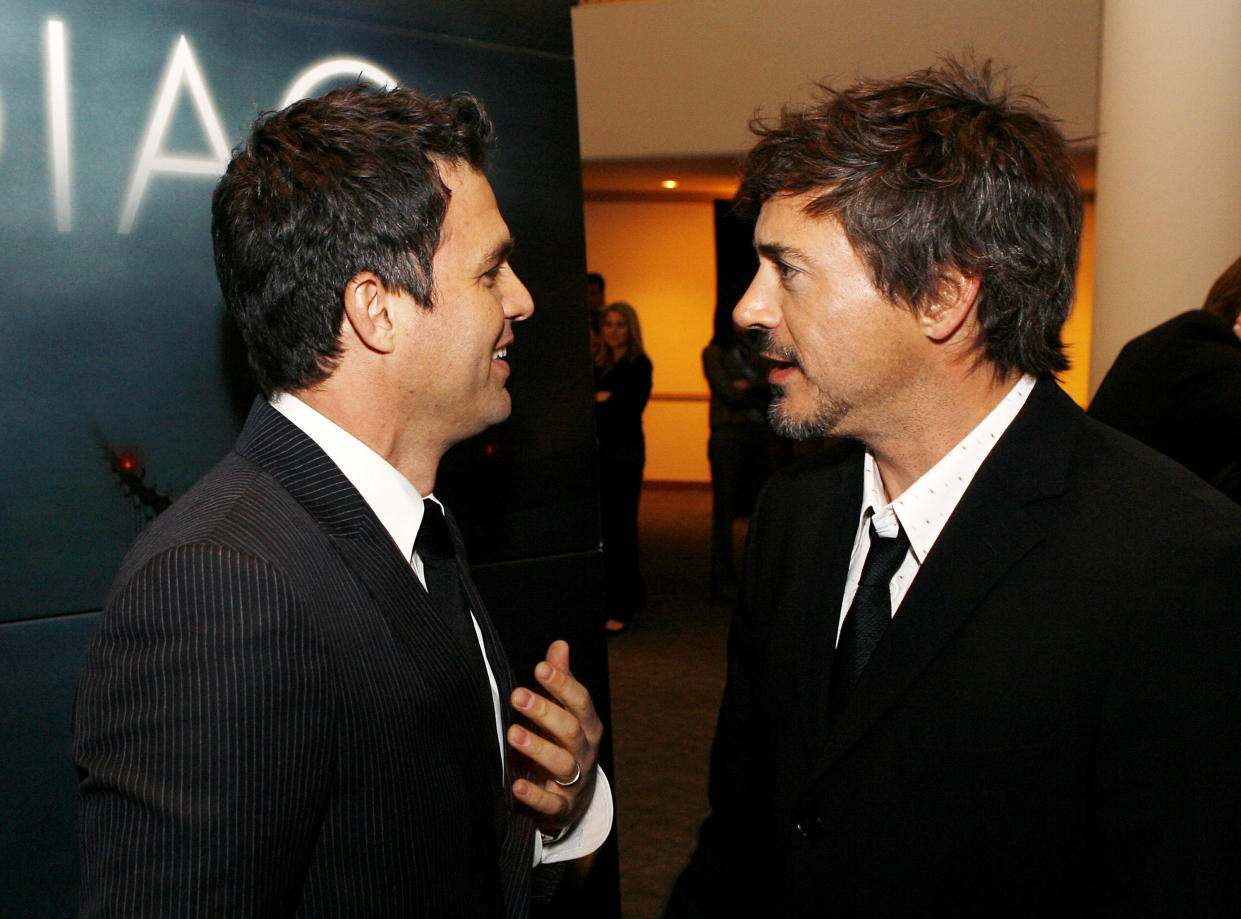Robert Downey Jr. and Mark Ruffalo Will Square Off For Best Supporting Actor This Year. This Should Have Happened at the 2008 Oscars, Too

- Oops!Something went wrong.Please try again later.
- Oops!Something went wrong.Please try again later.
- Oops!Something went wrong.Please try again later.
- Oops!Something went wrong.Please try again later.
Kevin Winter / Getty Images
On their surfaces, Robert Downey Jr. and Mark Ruffalo fulfill very different assignments for their respective Oscar-nominated turns in Oppenheimer and Poor Things. Downey’s Lewis Strauss works behind the scenes to discredit Cillian Murphy's Oppenheimer and get his security clearance revoked, dismantling a perceived rival (at least temporarily), while Ruffalo’s cartoony Duncan Wedderburn ushers along the sexual awakening of Bella Baxter (Emma Stone), only to watch in horror as she outgrows and surpasses him in every day. Yet their characters are both seeking control, albeit with decidedly different methodologies. Downey extends that control to himself, simmering through Strauss’s machinations, while Ruffalo, so often a performer of quiet power, flies into florid self-satisfaction. Both performances are—intentionally or not—inversions of the Marvel-superhero roles that have taken up so much of these actors’ time over the past decade-plus.
Downey boosted his iron-suited cred with press-conference and Congressional-hearing scenes where Tony Stark charmed and wisecracked his way out of trouble; Strauss works the system both more methodically and more sneakily, with Downey strategically receding into the part (and the vast Oppenheimer ensemble). Meanwhile, Ruffalo—who became more famous than ever for embodying a mild-turned-massive rage-monster who eventually finds a way to reconcile the Jekyll-and-Hyde sides to his personality—now plays a self-styled libertine and man of the world who winds up reduced to his impotent anger. During his adventures with Bella, Duncan becomes a man of hilariously sputtering apoplexy, wandering the streets as he pitches an ongoing fit over his ex-lover’s ability to take care of herself.
The Avengers introduced Downey’s Iron Man to Ruffalo’s recast Hulk, but it wasn’t the first time the actors intersected. Five years earlier, they honed their team playing on a different, far more ambiguous epic: David Fincher’s Zodiac. Either one of them would have been fine choices for the best supporting actor Oscar at the time; neither was nominated, and both would have had a hell of a time beating Javier Bardem in No Country for Old Men. Downey has the showier part, playing Paul Avery, a star crime reporter the San Francisco Chronicle who becomes an expert and a focal point in the Zodiac serial killer case, only to slowly, boozily unravel as the years pass without a resolution.
Even setting aside the character’s addiction issues, which were a clear echo of then-recent struggles in Downey’s own personal life, the performance is full of his actorly trademarks: Paul projects smarter-than-the-room aloofness that occasionally gives way to visible jitters, and without quite launching into motormouthed Iron Man mode, Downey gives every line just the right off-center spin. That his geeky friend Robert Graysmith (Jake Gyllenhaal) eventually finds him relocated to a houseboat, doing morning pulls off a liquor bottle, feels both logical and chilling—Downey expertly portrays a man who may never be in serious danger from the Zodiac, but gets thrown off his axis anyway, a collaborator in his own living demise.
Mark Ruffalo’s Dave Toschi sticks around longer. He’s a cop on the Zodiac case, lost in a maze of paperwork and inefficiently shared information, frustrated when it all becomes fodder for the first Dirty Harry movie. The case hangs over him, but it doesn’t quite drag him under, and Ruffalo does a beautiful job of playing that burden and the decency it threatens. In one great scene from a movie overflowing with them, Toschi agrees to hear Graysmith’s litany of circumstantial evidence that points to one particular suspect, and Ruffalo lets us see Toschi feeling the gravitational pull of the case once again—before he breaks it to Graysmith that none of this, however enticing, is good enough for a conviction.
This diner scene is the whole movie in a nutshell, and Ruffalo needs to anchor it, to keep it from sailing off into manic theorizing. It’s easy to understand why Zodiac didn’t curry favor with the Academy; great as they are, movies like Poor Things and Oppenheimer build to a sense of certainty, whether optimistic or doomy. Zodiac lives in a more unsettling, less resolved space. Downey and Ruffalo, in two of their best performances, are willing to occupy that void.
Originally Appeared on GQ

